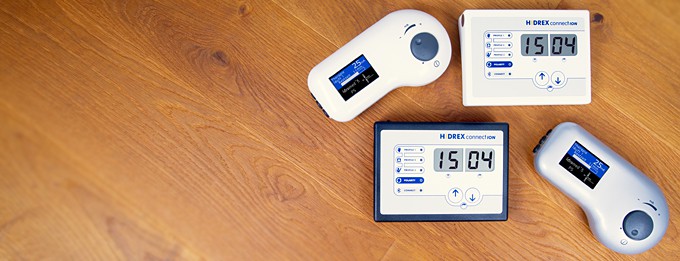Hyperhidrosis
When regular sweating turns into hyperhidrosis
Hyperhidrosis - Excessive sweating
Hyperhidrosis is a medical term. It describes excessive sweating that is not caused by physical exertion or high temperatures.
There are several possible treatment options for hyperhidrosis. We recommend iontophoresis. This treatment has been tried and tested for a long time.
It is important to note that every case of hyperhidrosis is different and there may be multiple treatment regimens that may work best for a particular individual.
To find the best treatment, you can consult a doctor or dermatologist. Online resources can help prepare you for a doctor's visit by giving an overview of potentially successful therapies.
Local/limited hyperhidrosis
Excessive sweating can be restricted to certain parts of the body. In these cases, smaller areas such as the hands, feet, armpits or face are primarily affected.
Generalized hyperhidrosis
Generalized hyperhidrosis affects the entire body. Luckily, this phenomenon is relatively rare.
Hyperhidrosis can lead to social and professional limitations, as well as psychological problems.
Luckily, hyperhidrosis is treatable. There are several treatment options, such as drug therapy, iontophoresis, and surgery.
Hyperhidrosis: treatment possibilities
Excessive sweating (hyperhidrosis) can be solved medically or through simple self-help treatments that can help with excessive sweating.
Hyperhidrosis: Some possible reasons you might sweat too much
- Lifestyle changes: Avoid any hot and humid environments and wear breathable clothing. Also, avoid alcohol, caffeine, and spicy foods.
2. Antiperspirants: Use an antiperspirant to reduce sweating.
3. Hygiene measures: Keep affected skin clean and dry by showering daily and changing your clothes.
4. Stress management: Stress can increase sweating, so it's important to reduce stress, e.g. through yoga, meditation, or exercise.
5. Medications: Some medications, like antidepressants, can reduce sweating, but they can also be the trigger. If the sweating is stress-related, nerve-calming agents be a natural help. However, if they trigger the hyperhidrosis in the first place, it's the complete opposite - logically.
6. Surgery: In severe cases of hyperhidrosis, surgery may be needed to remove the sweat glands.
7. Iontophoresis: This is a procedure that uses a mild electric current to reduce the sweat level.


Hyperhidrose - root causes and reasons?
Hyperhidrosis can occur for a variety of reasons.
Here are some possible causes:
- Genetic predisposition: Some people have a genetic predisposition to hyperhidrosis.
2. Overactive Sweat Glands: The sweat glands may be overactive, causing them to produce sweat unnecessarily.
3. Hormone Fluctuations: Hormone fluctuations, e.g. during menopause, can lead to hyperhidrosis.
4. Medications: Some medications, like antidepressants, can cause excessive sweating.
5. Metabolic Disorders: Metabolic disorders, such as hyperthyroidism (overactive thyroid gland), can cause hyperhidrosis.
6. Neurological disorders: Nerve disorders, such as Parkinson's disease, can lead to excessive sweating.
7. Stress and Anxiety: Stress and anxiety can increase sweating.
8. Pinched nerves, accidents and surgeries can trigger hyperhidrosis.
It is important to be aware that hyperhidrosis often occurs without an identifiable cause and that thorough diagnostics are required to determine the cause and to recommend and receive appropriate treatment.
Why does hyperhidrosis develop?
There is no definite answer as to why a particular person develops hyperhidrosis.
The causes of hyperhidrosis can be varied. They can result from a combination of factors, including genetics, hormonal fluctuations, drug use, metabolic disorders, neurological disorders, and stress.
If you suspect you have hyperhidrosis, you should see a doctor who can evaluate your symptoms and provide you with a diagnosis.
Thorough diagnostics may include: physical exam, medical history, tests for metabolic disorders or neurological disorders.
These measures ensure that you get the right treatment.

Which body parts can be affected by hyperhidrosis?
Where sweating occurs & which body parts are affected - hyperhidrosis and sweat
